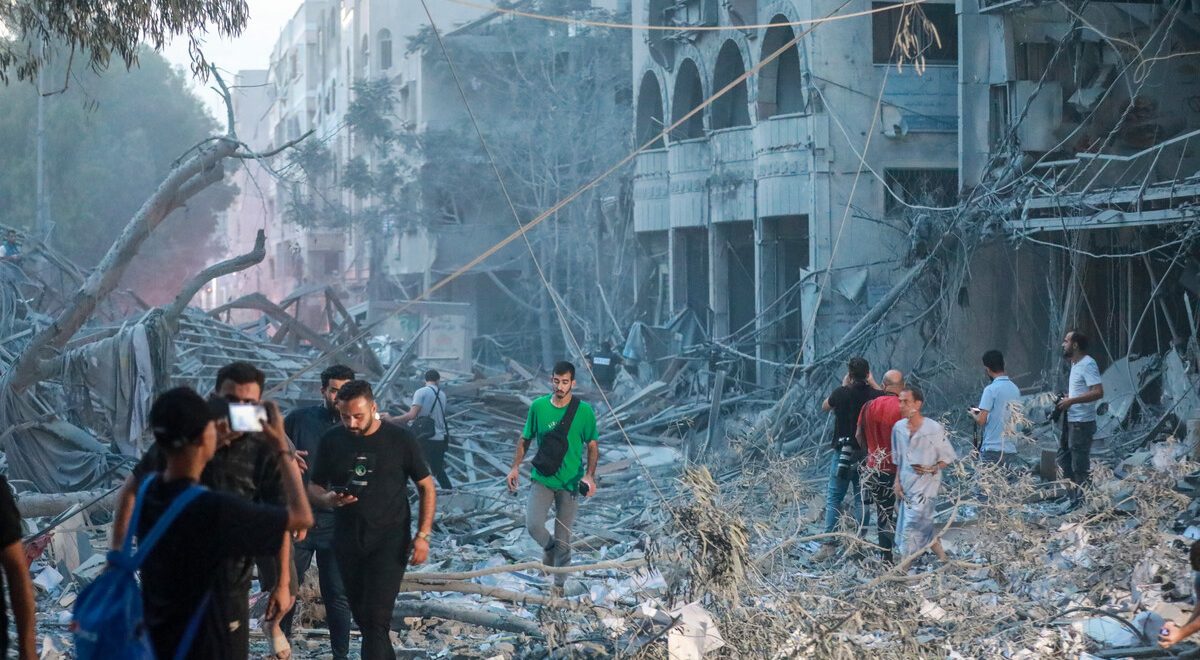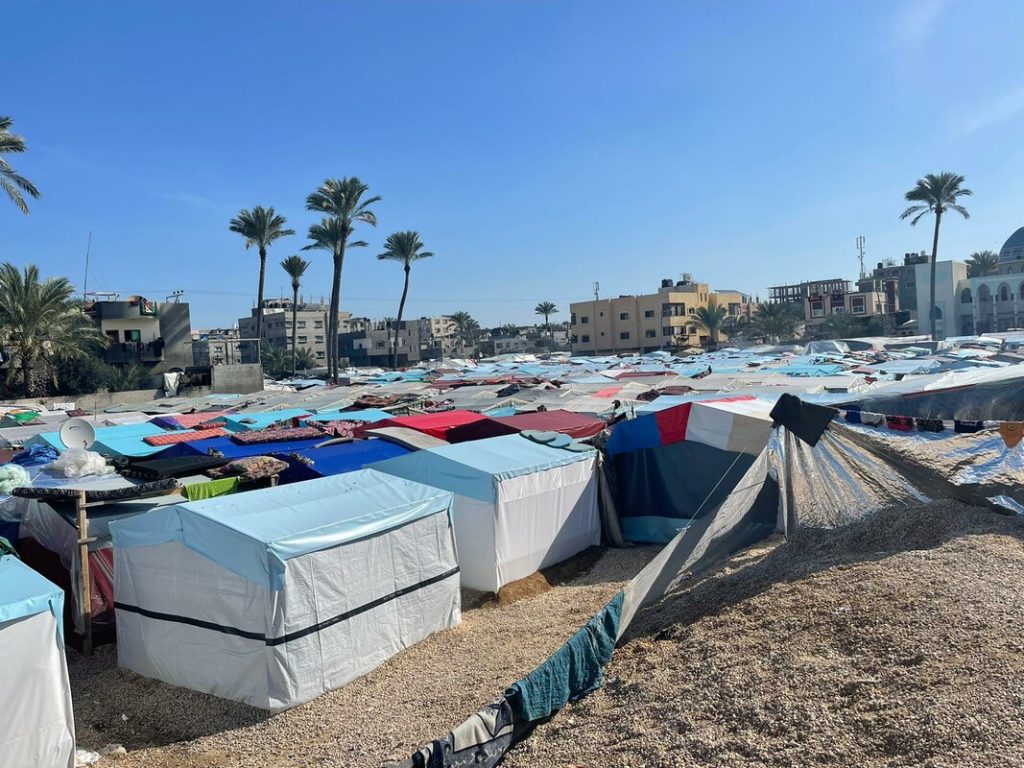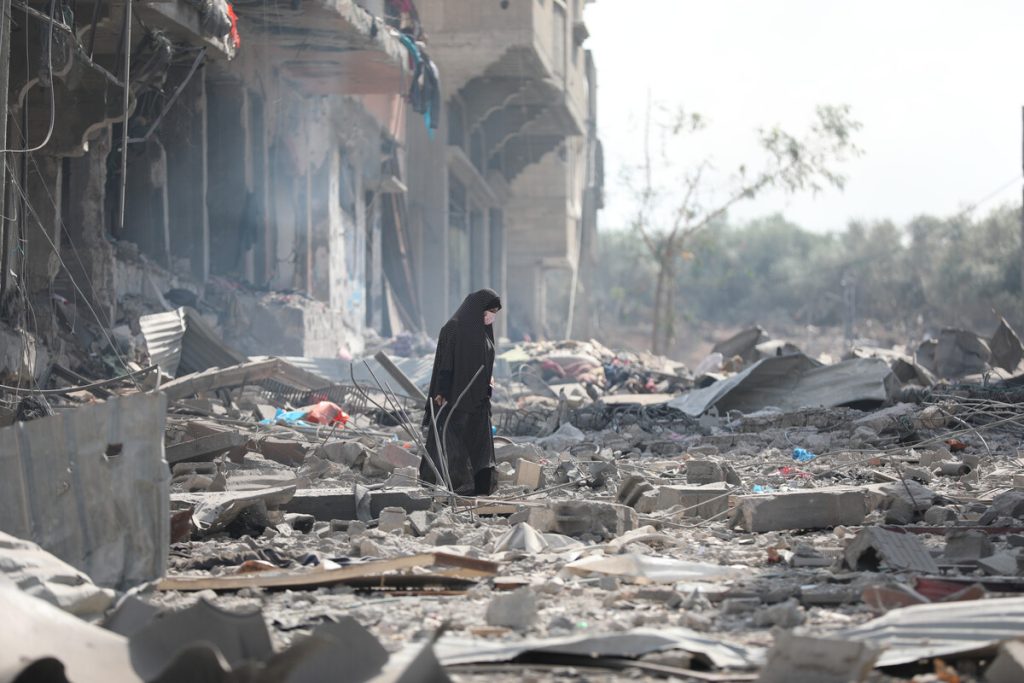
“Bombings persist all over the Gaza Strip. They are targeting civilians with no warning, causing heartbreaking tragedies. Every day, it’s a struggle for the basics. Anyone with a sense of humanity should not keep quiet about what is happening in Gaza,” – Shouq Al Najjar, coordinator at the Maan Development Center, a partner of ActionAid in Gaza.
2023 was the deadliest year for Palestinians since the Nakba of 1948. Now, 76 years have passed, and a staggering 85% of Gaza’s population finds themselves forcibly uprooted, grappling with an unimaginable reality from relentless airstrikes and violence by Israel. The situation underscores the urgent need for international attention and concerted action to address the ongoing humanitarian crisis facing the Palestinian people.
ActionAid has been working in the occupied Palestinian territory (oPt) since 2007, partnering with local women- and youth-led groups and health centers to support the most marginalized and vulnerable people. ActionAid’s humanitarian signature is guided by our Human Rights Based Approach (HRBA), which promotes the leadership, agency, and engagement of disadvantaged and marginalized communities at the center of the response, particularly women and young people. To achieve this, ActionAid works alongside longstanding local partners, women’s organizations and youth networks, to ensure inclusive participation that both identifies and addresses the real needs of people.
Since 2007, Palestinians in Gaza have been living under a blockade, meaning people and goods are prevented from freely entering and leaving Gaza by land, sea, or air. This severely limits basic necessities like food, medicine, and building materials from entering the besieged enclave.
Of the more than 2 million people who live in Gaza – 1.5 million are refugees, and half are children. Many have experienced conflict for a large part of their life and are battling severe trauma and emotional distress.

Camp for Internally Displaced People (IDP) in the south of Gaza. Photo: ActionAid.

people have been reached directly with humanitarian relief in Gaza.

people have been reached through food distribution efforts.

people received water, sanitation, and hygiene services.
After the attacks on October 7, 2023, in which approximately 1,200 Israelis were killed and more than 240 taken hostage, the Israeli government launched a disproportionate siege on Gaza and its civilian population, who were already crippled by 16 years of blockade. More than 48,291 Palestinians have been killed and 117,722 have been injured in Gaza since October 7, according to Gaza’s health ministry, while more than 10,000 people remain missing and unaccounted for, with many presumed buried under rubble.
In the immediate aftermath of the October 7th attacks, ActionAid put together an emergency response plan, alongside our partners in Gaza and the West Bank, to provide food, medical supplies, multi-purpose cash, and relief items to thousands of civilians.
Now, Gaza’s entire 2.2 million population is at imminent risk of famine – the largest percentage of a population ever recorded worldwide. Every single person in the territory is reliant on food aid, while aid currently entering Gaza is woefully insufficient.
On January 19, 2025, a ceasefire agreement came into effect in Gaza. While aid entering Gaza has significantly increased, it remains vastly insufficient compared to the immense needs. Palestinians in Gaza have continued to endure daily suffering since the end of the hostilities.
The funding cuts to the United Nations Relief and Works Agency (UNWRA), the largest facilitator of humanitarian aid in the territory, as well as meager aid deliveries through inefficient and dangerous means by the U.S., further threaten Palestinian lives in Gaza and the region.
As the human rights of people in the occupied Palestinian territories continue to be abused, women and children are especially at risk. Women and children make up around 70% of the total death toll. A child is killed every ten minutes in Gaza. More than three women are killed every hour, including two mothers every hour. Women are giving birth without anesthesia and are undergoing c-sections while awake and without painkillers, all amidst intense bombardment. Gaza is one of the most dangerous places in the world to be a woman or child right now.
Gaza faces a dire lack of medical facilities, schools, and homes, as so many have been destroyed by Israeli airstrikes. The situation is catastrophic. An immediate and permanent ceasefire and unobstructed, unfettered humanitarian aid is crucial for the safety and well-being of Palestinians.

Woman resident of Gaza City searches the rubble for belongings in the aftermath of bombing by the Israeli army. Photo: AIN Media/ActionAid.
While we welcome the UN Security Council’s call for the immediate, safe, and unhindered delivery of aid at scale to Gaza, our position is clear: only a permanent ceasefire will stop the killing of civilians and ensure that aid on the immense scale required can enter Gaza and reach those who need it. As we have repeatedly said: there is little sense in providing aid to people one day, only to start bombing them again the next. The UN Security Council resolution also called for a UN mechanism to monitor aid entering Gaza. Any screening process must be neutral, transparent, and efficient to ensure that much-needed critical supplies can make it into the territory.
With support from people like you, ActionAid is responding to the humanitarian crisis in Gaza by partnering with local organizations including Al-Awda Hospital, the only hospital left in northern Gaza that is providing maternity services. To date, only 11 of Gaza’s 36 hospitals are even partially functional.
We urgently need your support to address immediate needs and to prepare for the long-term requirements that will emerge once the siege is lifted. ActionAid is prepared to respond promptly, ensuring the well-being of thousands who have been left without access to food, water, or shelter.
Latest News on Gaza Humanitarian Crisis
Check out the latest press releases from ActionAid USA
Latest Stories and Insights on Gaza Humanitarian Crisis
Check out the latest stories from ActionAid USA
The urgency of the situation cannot be overstated: every single day that passes without a permanent ceasefire further deepens this stain on humanity’s collective conscience. The violence must stop, hostages must be freed, innocent captives must be released, and humanitarian aid must flow freely. It is critical that the U.S. takes decisive action to address the catastrophic humanitarian crisis in Gaza and upholds its obligations, bound by international law, to protect civilians in times of conflict. Your advocacy and attention to ongoing violence in Gaza is critical.